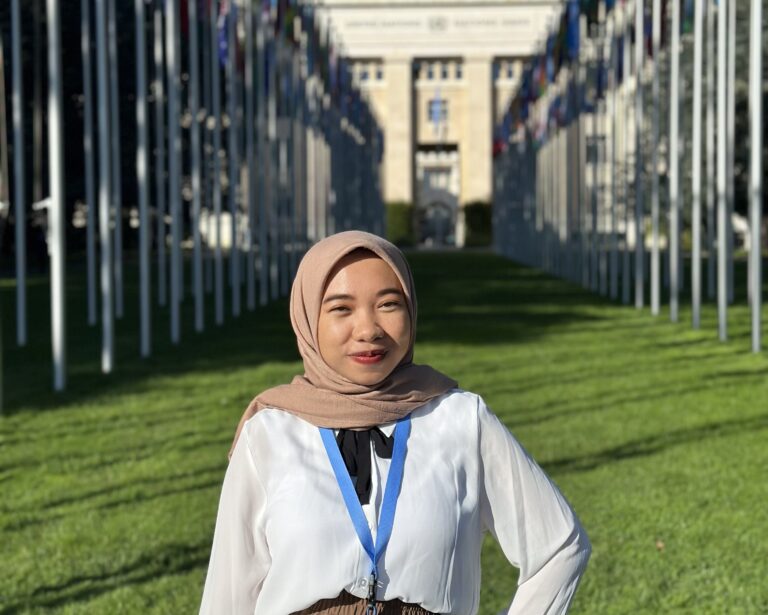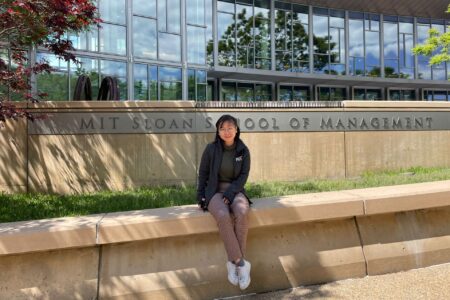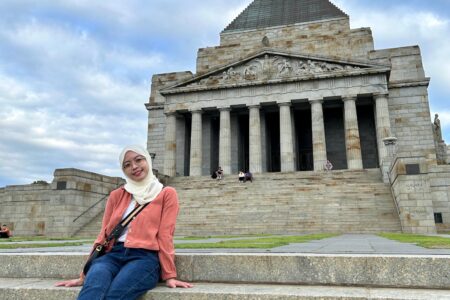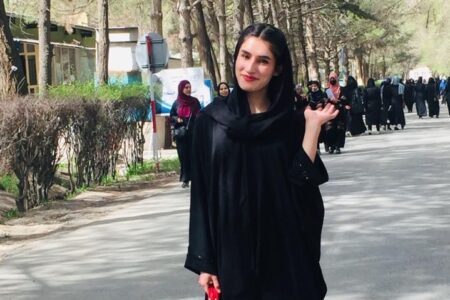
Changing degrees isn’t an easy decision. In Adristi Maulida Fauzi’s case, she would lose all of the two years of time, effort, and money she’s poured into the programme.
In the end, Adristi knew she had to do it. As agonising as it was then, today she calls it “the best decision” she’s ever made.
Adristi’s university story begins in Russia, far from her home country of Indonesia.
Growing up, Adristi never thought she’d go abroad for university. The norm was to attend a state university after completing her secondary education.
But when her older sister went to university outside their home city, her mother encouraged Adristi to do the same.
“She saw how my sister became more independent,” says Adristi, “So I thought, ‘Okay, I’ll just go to another city for my studies then.”
Little did she know she would not only leave her city and state, but her country and region too — going all the way to Russia.
It was an unconventional choice — most Indonesians go to universities in Australia, Malaysia, the US, Japan, and the UK.
Adristi first got to know about Russia through a senior.
“When I asked her why she made this decision, her explanation blew my mind. She said that Russia has a good education system, especially when it comes to science majors,” she says.
When Adristi did her own research, she found the same, as well as a new path ahead of her.
“Back then, I didn’t know what I wanted to do,” she says. “I’ve always been a science major in school – my only non-science experience was when I became the vice president of the student council.”
The role involved working with people and lots of public speaking, which interested Adristi at the time but wasn’t enough to convince her to pursue a non-science major.
Other factors came into play too. Adristi’s parents, both of whom are in the fields of STEM (that’s Science, Technology, Engineering and Mathematics), supported her pursuit of a science major, and stories of international exposure from her senior made Russia seem like a good place to explore something different.
And so it was off to Russia she went.

Adristi spent her first year in Russia learning the local language in the town of Barnaul before moving to Novosibirsk for university. Source: Adristi Fauzi
The journey of a thousand miles begins with learning Russian
Adristi spent her first year in Russia taking a language course. It was something crucial as her programme, a bachelor of science in business informatics, was going to be taught entirely in Russian.
But the language skills weren’t just for academic purposes – it was for her new life too.
No one in the town of Barnaul spoke much English, so Adristi took this opportunity to master the foundation of the Russian language quickly.
The real challenge came in her second year in Russia at Novosibirsk, notably when she began her first year at Novosibirsk State University.
The difficulty neither stemmed from learning business informatics in a language she picked up just a year prior, nor the fact that she had to adapt to a new education system after only being exposed to one kind in Indonesia for most of her schooling years.
It came from not having someone in the same shoes as her when she was going through these momentous events – not only was she the only foreigner in her entire class; she was the only foreigner in her cohort
“The friends I made at the university were locals, so they didn’t know the struggle that I went through; they don’t know how hard it is to learn a subject in a third language that you’ve not even mastered that much,” says Adristi.
“When we do presentations, they’re great at it because they were born and raised speaking the language, but for me, even though I know what I want to say, I don’t know how to say it. So it was very challenging.”
Beyond that, Russia’s education system wasn’t what Adristi was expecting. Rather than choosing her own schedule, everything was predetermined, leaving no room for personal time or other recreational activities. Plus, as much as she tried, it was simply harder to integrate into the community when there were few, if any, international students.
By the end of her first year, Adristi knew she didn’t want to pursue a future in business informatics despite her interest in the subject. She also wondered if she wanted to remain studying in Russia.
“I had this identity crisis where I was wondering if I should continue for another three years or just move on to another programme,” says Adristi. “But there’s this Indonesian mentality where changing degrees or taking a gap year means wasting your time. The goal is to finish your studies as soon as possible.”
Her family was of the same mind: changing degrees at this point wasn’t the best move, and going to another country after spending two years in Russia would mean wasting two years of progress.
At this point, Adristi hit a “very low point of my life.” “I’ve never been this stressed out. It was like no one was on my side.”

Adristi chose Milan specifically because of its diverse population, as well as the University of Milan’s programme offering and student experience. Source: Adristi Fauzi
Changing degrees to determine the course of the future
At that point, Adristi saw the cons of continuing her current path far outweighed the fear of starting a fresh chapter.
And she knew one thing for certain: there was no point in forging ahead in her Russian business informatics programme for the next three years if she had no intention of finding a future in that industry.
“In my mind at that time, I would rather waste my two years for my next three years than save the previous two years and destroy the upcoming three.”
In fact, she already had her eyes set on a new path: pursuing a political and social sciences programme, like international relations, somewhere in the European Union.
Adristi wasn’t a fan of the Russian political-social curriculum, and obtaining it in a nearby EU country meant that she would be studying in English — she wouldn’t need to master another language to the point she would be proficient enough to use it at university.
While her argument was sound, her parents and friends back home thought otherwise.
To them, a degree in international relations wasn’t going to amount to much, at least compared to someone with a background in business informatics. The job prospects seemed bleak, and with corruption worldwide, it didn’t appear to be a safe career pick. And was it so difficult to just stick out with her current degree for another three years?
Adristi’s final choice is proof enough.
“I decided that I would take this risky decision even though no one supports me,” she says. “I felt like if I stayed in Russia, I wasn’t going to get better off – I’m actually going to be worse off.”

Adristi, pictured on the bottom row, third from the left, with the intern community at the International Trade Centre. Source: Adristi Fauzi
If at first you don’t succeed, try, try again
If you need proof that the first step is the hardest, Adristi’s journey is proof of that. Once she made the decision of changing degrees, things fell into place.
She was accepted into the University of Milan’s International Politics, Law, and Economics programme. Her visa application was approved in record time, and she secured a place in a student residence on the day she arrived in Italy.
Ultimately, Adristi wanted three things from changing degrees and countries: mastering her new major, living this latest chapter to the fullest, and getting the international exposure she had hoped to get while in Russia.
It’s a big reason why she chose Milan over Bologna in the first place despite getting a university offer from the latter location.
“The university in Bologna ranked better than the University of Milan, but Bologna is a small city, and I learned from my time in Russia that I didn’t like living in a small city,” Adristi explains. “My friends said that I made a stupid decision, but for me, the rank of the university doesn’t matter much anymore.”
“I learned that living abroad is not just about being in a good university, but it’s also about living in a good environment where you feel at home, at ease, and when you don’t feel pressured. And I don’t want to experience that pressure again, just like what I had before in Russia.”
Now, Adristi’s reaping the benefits of her decision.
Her classes are much more diverse, she has more say in her schedules, and there is a range of student organisations that welcome international students with open arms.
On top of that, she’s learning about something she’s really interested in.
“I realised in Russia that I’m more people-oriented. My heart belongs to the society and its people, even though my brain capacity belongs to the numbers,” laughs Adristi. “I want to know why one country is different from another, why politicians think the way they do, but I can’t just focus on that because then I’ll score badly on my exams.”
Luckily for her, the International Politics, Law, and Economics programme strikes the perfect balance, allowing her to dive into this interest without her grades suffering for it.
Better yet, Adristi’s one – albeit massive – decision of changing degrees has brought forth a wealth of experiences she would not have had otherwise.

Adristi, pictured fifth from the left, at the Embassy of the Republic of Indonesia in Lebanon. Source: Adristi Fauzi
She worked as an intern for the Embassy of the Republic of Indonesia in Beirut, Lebanon, during an economic and political crisis. She was in Geneva, Switzerland, for six months as an Institutional Strengthening Support Intern for the International Trade Centre. She’s currently a 4EU+ Alliance Global Student Ambassador.
And once she’s finished her undergraduate studies, Adristi has her sights set on a master’s degree somewhere away from Italy to begin anew.
There’s no telling what lies ahead in her future, but Adristi is optimistic and ready to face the challenge head-on.
Her parting advice to anyone going through something similar is this: don’t wait for someone in your journey, and understand that there will always be an opportunity cost involved.
“There were always people who told me that they wanted to do what I was going to do and that they wanted to come along with me, but they don’t have the same willingness to sacrifice the things it takes to get to where I’m at now. If you’re going to wait for someone, you’ll never get to it.”
“And life is always about choosing. When you see someone with a lot of achievements, when you see someone who got to experience a lot of things, know that there are a lot of costs that come with it.”
“I gave up on fully funded exchanges to participate in my internships, and during that time, I also missed almost a year of classes. So I have to catch up on the exams I missed last year on top of my exams this year – so there’s always an opportunity cost somewhere.”










